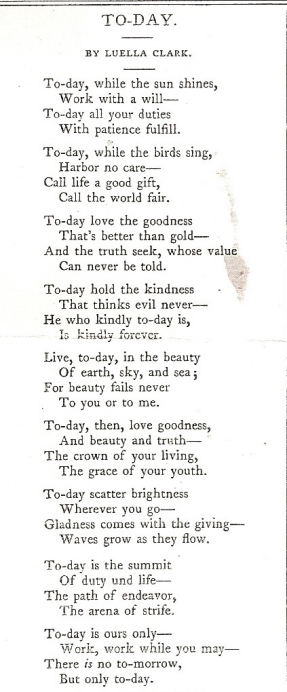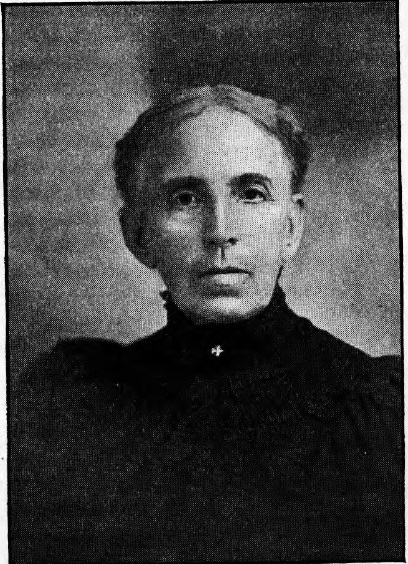“Today, While the Sun Shines” has long been a favorite Latter-day Saint hymn. Published in nearly every Latter-day Saint Primary and Sunday School song book over the past century, this hymn was not included in the official Church hymnal until 1948. The text, today inextricably linked with composer Evan Stephen’s energetic tune, is not of Latter-day Saint origin, and remained anonymous until the 1985 hymnal, when the author’s name was listed simply as “L. Clark.” Originally, the date “ca. 1883” accompanied Clark’s name, but this date was changed in later printings to “ca. 1880,” probably in reference to the two 1880 Primary song collections in which this hymn appears: Hymns and Songs: Selected From Various Authors for the Primary Associations of the Children of Zion, and Tune Book for the Primary Associations of the Children of Zion, both compiled by Eliza R. Snow. This 1880 date is somewhat puzzling, however, as “Today, While the Sun Shines” appears in at least three earlier Latter-day Saint publications: the Juvenile Instructor, May 1, 1868, the Millennial Star, June 13, 1868, and the Juvenile Instructor, September 15, 1877, the last of which marks the first appearance of Stephen’s tune.

Nevertheless, the earliest known publication of “Today, While the Sun Shines” is in the April 1868 issue of the children’s periodical the Little Corporal. From this source we learn that this poem, originally titled “Today,” was written by Luella Clark (1832-1915), a nineteenth-century poet whose works include “Up the Hill A-Berrying” and “Little by Little.”
“Today, While the Sun Shines” was later altered (probably by Stephens) to fit the musical setting. The text was further altered by editors of the 1985 hymnal. As Latter-day Saint hymnologist Karen Lynn Davidson explains, complaints had been received throughout the years at the office of the General Music Committee by Church members who objected to the hymn’s original last line “There is no tomorrow, but only today.” Some felt that “the line almost had the ring of ‘Eat, drink, and be merry, for tomorrow we die’” (Davidson, 239), and so this was changed to “Prepare for tomorrow by working today.” But this one line change, sung at the completion of each verse, alters the entire message of the hymn. Instead of reminding us that no one is promised another day here on earth and therefore should do all the good we can today, the line change admonishes us that the way to prepare for an eternal tomorrow is by working today; in other words, to paraphrase president Russell M. Nelson’s 2005 conference talk “Now is the Time to Prepare,” we should do everything we can today to inherit the Celestial Kingdom tomorrow. In this context, the revision of the last line will likely be acceptable to many Church members, even if it does not accurately reflect the author’s original intent. As poetry, this line change is merely serviceable, and is in no way superior to the original.

Sources:
E. Stephens, “To-day,” Juvenile instructor 12, no. 18 (September 15, 1877), 216; Eliza R. Snow, Hymns and Songs: Selected from Various Authors for the Primary Associations of the Children of Zion (Salt Lake City: Deseret News Printing and Publishing Establishment, 1880), 18-19; Eliza R. Snow, Tune Book for the Primary Associations of the Children of Zion (Salt Lake City: Juvenile Instructor Office, 1880), 21;“To-day,” Latter-Day Saints’ Millennial Star, June 13, 1868, 384; “To-day,” Juvenile Instructor 3, no. 9 (May 1, 1868): 72; Luella Clark, “To-day,” Little Corporal 6, no. 4 (April 1868): 56; Rev. William I. Ward, “A Rare Spirit Hears the Master’s ‘Well Done!’” Zion’s Herald, December 1, 1915, 1520; Karen Lynn Davidson, Our Latter-Day Hymns: the Stories and the Messages (Salt Lake City: Deseret Book Company, 1988), 239.